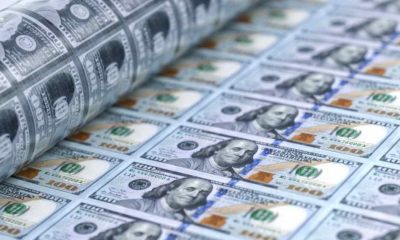Economy
How Interest Rates Affect the Stock Market
Interest rates: they affect nearly every aspect of our lives.
Whether we’re buying a house, or paying off credit cards, we need to keep an eye on interest rates to make sure our money goes as far as it can.
But interest rates can affect the stock market, too.
Even if you haven’t invested in any stocks, the link between interest rates and the stock market can impact your life.
Read on to find out how.
What is Interest?
- Interest is simply the fee you pay to use someone else’s money.
- Institutions like banks and other types of lenders charge interest.
- Sometimes, bank customers can earn interest on certain accounts, usually savings accounts or a certificate of deposit (more commonly known as a CD).
- Interest rates are typically calculated as a percentage.
- Interest rates can fluctuate depending on some economic factors.
- Essentially, interest rates are a way to compensate an institution or individual for taking the risk of lending money.
How Does Interest Work in the Stock Market?
Most people are familiar with interest rates due to their mortgages and credit card bills.
But interest works a little differently when it comes to the stock market.
The Federal Reserve’s funds rate is the interest that banks and credit unions pay to borrow money from Federal Reserve banks.
This rate is set approximately every six weeks, during meetings held by the Federal Open Market Committee (FOMC).

Figure 1: History of The Federal Funds Rate
The Federal Reserve, or the “Fed”, uses this interest rate to keep inflation in check.
(Inflation is caused by a simultaneous increase in prices and a decrease in the purchasing value of money.)
It does this by controlling the amount and worth of money available to purchase goods.
In theory, when the Fed increases the federal funds rate, the amount of money in circulation will decrease, while the price to borrow it will increase.
[ms_divider style=”normal” align=”left” width=”100%” margin_top=”30″ margin_bottom=”30″ border_size=”5″ border_color=”#f2f2f2″ icon=”” class=”” id=””][/ms_divider]
[ms_featurebox style=”4″ title_font_size=”18″ title_color=”#2b2b2b” icon_circle=”no” icon_size=”46″ title=”Recommended Link” icon=”” alignment=”left” icon_animation_type=”” icon_color=”” icon_background_color=”” icon_border_color=”” icon_border_width=”0″ flip_icon=”none” spinning_icon=”no” icon_image=”” icon_image_width=”0″ icon_image_height=”” link_url=”https://offers.thecapitalist.com/p/warrenbuffet/index” link_target=”_blank” link_text=”Click Here To Find Out What It Said…” link_color=”#4885bf” content_color=”” content_box_background_color=”” class=”” id=””]Warren Buffett Just Told His Heirs What He Wants them To Do With His Fortune When He Dies. [/ms_featurebox]
[ms_divider style=”normal” align=”left” width=”100%” margin_top=”30″ margin_bottom=”30″ border_size=”5″ border_color=”#f2f2f2″ icon=”” class=”” id=””][/ms_divider]
What Happens When the Federal Rate Increases?
An increase in the federal funds rate will not immediately affect the stock market.
The primary result of increase is the expected one: banks have to pay more to borrow from the Fed.
That’s essentially the first effect of any increase in interest rates.

Figure 2: Estimated rate increase patterns in 2015, despite wage growth and a high employment rate (Business Insider)
The consequences of an increase might not be immediately evident in the stock market, but they can have a ripple effect on individual consumers and businesses alike very quickly.
Here’s how:
- Banks will first have to increase their interest rates since they now have to pay more to access the money they lend to their customers.
- Both mortgage and credit card interest rates will increase. This is especially unfortunate for homeowners or other types of borrowers who have variable interest rates.
- As a result, consumers will have less disposable income, causing them to decrease their discretionary spending.
- The decline in spending will directly affect companies’ revenue, potentially resulting in a drop in profit.
- Let’s not forget businesses borrow money from banks, too – when the rate increases, companies are less likely to borrow and will also lose money by paying the higher rate.
- Businesses will then have less money to spend and will, therefore, spend less; a decrease in spending can often impede the growth of a company.
- When a company cannot grow, it cannot increase profits.
How Does the Increase Affect the Stock Market?
Of course, increasing the federal funds rate will immediately and directly influence the way consumers and businesses spend their money.
Those changes in spending are what will eventually affect the stock market.
One way of appraising a company is by determining the sum of that company’s expected future cash flows, discounted back to the present.
In order to calculate a stock’s price, find the sum of the future discounted cash flow and divide that value by the number of shares available.
People’s assumptions about or attitudes toward the company can also influence that price at a given time.
Depending on the correlation between the two, consumers might be more or less willing to invest at different prices.
If a business has decreased spending or is earning less profit, the likely consequence is that their expected future cash flows will drop.
Assuming all other financial aspects of the company are equal, the price of the company’s stock will decline as a result.
If several businesses experience these decreases, the whole market is at risk of going down.
How Does this Affect Investment?
No investor wants the market to go down; they want to watch their investments accrue value rather than lose it.
That’s one of the primary reasons they invest in the market in the first place.
Stock price appreciation and payment of dividends help investments gain value.
When an increase in the federal rate hinders a company’s ability to grow, investments will not grow as much from stock price appreciation.
If investments stop growing, people will be more reluctant to invest.
Owning stocks could also be considered riskier when the rate goes up.
Government securities like Treasury bills and bonds are considered safer investments when the Federal funds rate increases.
Their interest rates will rise also.
However, because the “risk-free” rate of return increases, these types of investments are considered more beneficial during times of increased interest rates.
When traders invest, it’s important that they are compensated for the extra risk they are taking by making the investment – a premium above the risk-free rate.
The ideal return for investing is determined by taking the sum of the risk-free rate and the risk premium.
Investors’ risk premiums vary, depending on the companies they invest in, and how much they are willing to risk.
When the risk-free rate goes up, the result is an increase in the total return needed to invest.
A lower risk premium and a stable or decreased potential return might lead investors to surmise that the stock market has become risky.
Summing Up: The Fed Rate, the Stock Market, and You
The Federal Reserve interest rate has a profound influence on the economy:
- When the rate increases, there is less money in circulation.
- Though this helps to lower inflation, it causes borrowing to become more expensive.
- When borrowing is more expensive, it directly impacts how much money consumers and businesses have to spend.
- This results in a change in both consumer and business spending habits.
- Higher rates increase expenses for businesses, which could potentially result in a business decreasing wages to make up for the lost funds.
- People are less likely to want to invest in the market when rates are higher.
- So, basically decreased investments result in decrease of people investing, which in turn affect the rates
However, it is important to remember that the stock market is not a static system.
The description provided above serves to explain the phenomenon in theory.
In practice, the effects of the interest rate on the stock market might not be so clear cut.

Figure 3: An example of a positive relationship between the Fed rate and the stock market
Stock values fluctuate according to many factors besides the federal interest rate.
Several aspects play a role in determining stock prices, and the interest rate is only one of many of them.
Because of this, an investor can never be sure if an increase in the federal rate will hinder (or possibly help) the stock market.















